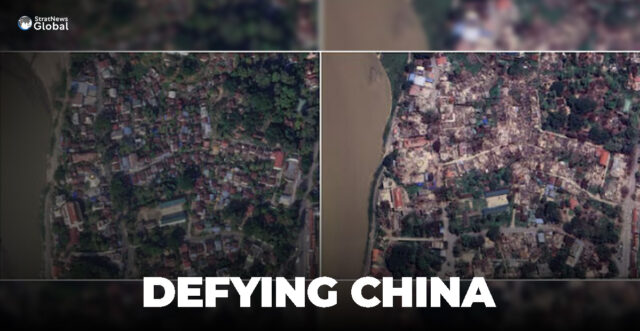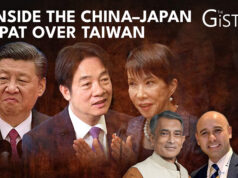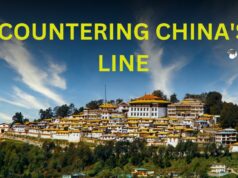The global supply of heavy rare earths partly depends on the outcome of a prolonged conflict between a rebel group and the Chinese-backed military junta in the hills of northern Myanmar.
The Kachin Independence Army since December has been battling the junta over the town of Bhamo, less than 100 km (62 miles) from the Chinese border, as part of the civil war that erupted after the military’s 2021 coup.
Nearly half of the world’s heavy rare earths are mined in Myanmar’s Kachin state, especially near the key town of Bhamo, and sent to China for processing into magnets used in electric vehicles and wind turbines.
China, which holds a near-monopoly on rare earth processing, has threatened to stop buying minerals from areas controlled by the Kachin Independence Army (KIA) unless it halts efforts to seize full control of Bhamo.
The ultimatum, delivered during a May meeting with Chinese foreign ministry officials, reflects Beijing’s use of mineral supply chains to assert geopolitical influence. This marks the first report of such pressure, highlighting rising tensions in the region’s battle over resources and control.
Reuters could not determine whether China had carried out its threat. Fighting in the region has restricted mining operations and rare-earth exports from Myanmar have plunged this year.
China spooked global supply chains this spring when it restricted exports of the minerals in retaliation against US President Donald Trump’s tariffs. It is now using its dominance to shore up Myanmar’s beleaguered junta, which China sees as a guarantor of its economic interests in its backyard.
China’s foreign ministry said in response to Reuters’ questions that it was not aware of the specifics of deliberations with the KIA.
“An early ceasefire and peace talks between the Myanmar military and the Kachin Independence Army are in the common interests of China and Myanmar as well as their people,” a ministry spokesperson said.
A senior KIA general did not respond to a request for comment.
The KIA official, who spoke on condition of anonymity to discuss sensitive matters, said Beijing also offered a carrot: greater cross-border trade with KIA-controlled territories if the militia abandoned efforts to seize Bhamo, a logistics hub for the junta that’s home to some 166,000 people.
“And if we did not accept, they would block exports from Kachin State, including rare-earth minerals,” said the official, who did not elaborate on the consequences of an economic blockade.
Beijing is not seeking to resolve the wider civil war but it wants fighting to subside in order to advance its economic interests, said David Mathieson, an independent Myanmar-focused analyst.
“China’s pressure is a more general approach to calming down the conflict.”
Defying China
The battle for Bhamo began after the Kachin Independence Army (KIA) took control of Kachin’s main rare-earth belt in October. Following the takeover, the KIA raised taxes on miners and cut production of key minerals like dysprosium and terbium, causing prices to surge.
China’s imports of rare-earth oxides and metals from Myanmar dropped by 50% in the first five months of 2025, though exports rose over 20% from April to May.
Formed in 1961, the KIA is one of Myanmar’s most powerful rebel groups, with over 15,000 fighters, long experience in combat, and funding from natural resources and local taxation.
The KIA remains confident of capturing Bhamo, believing that China will not follow through on its threat to block mineral exports, given its dependence on rare earths. Myanmar has been in turmoil since the 2021 military coup, which triggered nationwide armed resistance.
Anti-junta forces have captured large areas, but China has pressured them to compromise with the military, supplying the junta with drones and jets. China, which has major investments in Myanmar, earlier brokered a ceasefire to help the military return to Lashio.
Around 5,000 KIA and allied fighters are involved in the Bhamo offensive. Losing Bhamo would isolate junta troops and weaken military control over northern trade routes, according to a former junta major.
“China may have been exerted pressure and offered incentives to the KIA,” it said in a statement.
Beijing first urged the KIA to retreat from Bhamo during talks in December, but the rebels instead intensified their offensive, according to KIA sources. The battle has cost the KIA heavily, with hundreds of casualties, as noted by the International Institute for Strategic Studies.
In later spring talks, China grew more assertive, threatening to halt rare-earth imports. A prolonged disruption in supply from Kachin could cause a global shortage by year-end, warned Neha Mukherjee of Benchmark Mineral Intelligence.
Supplies of the critical minerals outside China were already constrained, she said: “In the short term, during the brief disruption period, prices outside of China could shoot up higher.”
Battle For Bhamo
The KIA has pushed junta troops into isolated pockets, but the military retains air superiority and has heavily bombed Bhamo. According to KIA officials and residents, relentless airstrikes have killed civilians, including children, and destroyed schools and places of worship.
The junta claims it targeted locations used by the KIA for military purposes, though it has provided no evidence. Nathan Ruser, an analyst at the Australian Strategic Policy Institute, reviewed satellite imagery and confirmed that most of the town’s damage appears to be from airstrikes.
“I don’t know for how long that the revolutionary groups will be able to resist Chinese pressure,” she said, adding that existing border restrictions had led to shortages of petrol and medicine in Kachin.
Despite the obstacles, KIA leaders believe capturing Bhamo would shift momentum in their favour and strengthen public support.
If the ethnic army were to take control of the entire state, then Beijing would have no option but to negotiate and sideline the junta, the commander and the official said.
“China, which needs rare earths, can only tolerate this for a limited time,” the commander said.
(With inputs from Reuters)





